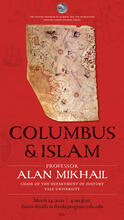Event time:
Wednesday, March 24, 2021 - 4:00pm
Location:
Zoom
Event description:
Register in advance for this meeting:
After registering, you will receive a confirmation email containing information about joining the meeting.
Christopher Columbus lived the vast majority of his life in a Mediterranean world in which the Ottoman and Mamluk Empires dominated the eastern part of the sea and were in constant economic, political, and confrontational interaction with the Christian states of Europe. This talk considers the importance of Islam in shaping Columbus’s life and voyages. In doing so, it thinks critically about the role of Islam in the Spanish decision to send him across the ocean and in the early history of the Spanish Caribbean. It furthermore uses this Muslim history of Columbus to suggest ways of analyzing early modern periodization and the place of Islam in the making of the modern world.
Alan Mikhail is a historian of the early modern Muslim world, the Ottoman Empire, and Egypt whose research and teaching focus mostly on the history of empires and environments.
He received his Ph.D. from the University of California, Berkeley, where his dissertation won the Malcolm H. Kerr Award of the Middle East Studies Association and Berkeley’s James H. Kettner Award. He was a member of the Andrew W. Mellon Fellowship of Scholars in the Humanities at Stanford University before coming to Yale in 2010.
Professor Mikhail is the author of The Animal in Ottoman Egypt (Oxford University Press, 2014) and Nature and Empire in Ottoman Egypt: An Environmental History (Cambridge University Press, 2011). He is also the editor of Water on Sand: Environmental Histories of the Middle East and North Africa (Oxford University Press, 2013).
His articles have appeared in journals such as the American Historical Review; Environmental History; Comparative Studies in Society and History; Global Environment; International Labor and Working-Class History; the International Journal of Middle East Studies; Comparative Studies of South Asia, Africa and the Middle East; the Journal of the Economic and Social History of the Orient; History Compass; the Bulletin of the History of Medicine; and, in Arabic, in al-Rūznāma, Akhbār al-Adab, and Wijhāt Naẓar.
He is the recipient of the Roger Owen Award of the Middle East Studies Association, the Alice Hamilton Prize of the American Society for Environmental History, the Wayne D. Rasmussen Award of the Agricultural History Society, the Ömer Lütfi Barkan Prize of the Ottoman and Turkish Studies Association, and Yale’s Gustav Ranis and Samuel and Ronnie Heyman Prizes.
Professor Mikhail currently serves on the editorial boards of Cambridge Studies in Islamic Civilization and the Palgrave Macmillan Series in World Environmental History, as well as the International Journal of Turkish Studies and Environmental History. He was formerly on the editorial board of the International Journal of Middle East Studies.
His research has been supported by the Council of American Overseas Research Centers, the Andrew W. Mellon Foundation, the Fulbright-Hays Commission, the American Research Center in Egypt, the Institute of Turkish Studies, and Yale’s MacMillan Center for International and Area Studies.
Professor Mikhail teaches undergraduate and graduate courses in the history of the early modern Muslim world and Mediterranean, the Ottoman Empire, and environmental history.
Admission:
Free but register in advance
